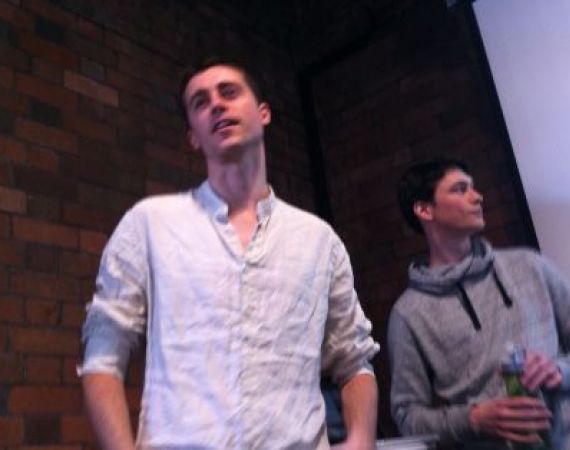Posted on Thu 10 Apr 2014
Growing a community of web-native storytellers - Lunchtime Talk Write-up
On Friday 21 March, Gilles Pradeau and Philo van Kemenade came to the Studio to talk about Popathon, a series of weekend hackathons that bring filmmakers, web developers and designers together to explore web-native storytelling. Gilles and Philo were at Watershed to take part in i-Docs, an…

Philo and Gilles
On Friday 21 March, Gilles Pradeau and Philo van Kemenade came to the Studio to talk about Popathon, a series of weekend hackathons that bring filmmakers, web developers and designers together to explore web-native storytelling. Gilles and Philo were at Watershed to take part in i-Docs, an interactive documentary festival convened by DCRC, so we seized the opportunity to bring them in to share some of the lessons they have learned from organising these international events, and to discuss and demo the outcomes.
The Popathon weekends are organised to explore how Popcorn Maker could be used for storytellers. Popcorn,js is a package (or library) of code that extends what you can do with Javascript to work with time-based media. Mozilla have built Popcorn Maker, simple point-and-click tool that allows you to attach different layers of events on top of a timeline to create ‘rich-media pages’; as a very simple example, when someone is half-way through watching a video, the background colour of the webpage changes.
Gilles and Philo organised their first Popcorn event as a two-hour hack, and quickly realised that they needed to organise something longer and more intensive. They began holding weekend events in different cities, and started to figure out the vital components for the events. They realised that they needed a multidisciplinary range of people, to actually create a prototype that they could share with the world, and that all code they created or doctored needed to be open source.
The time limit was a challenge, especially for people who approached the event with a fully formed project in mind. Participants worked better when they broke their ideas down into manageable chunks, and kept their expectations simple.
Gilles and Philo showed us a few examples of the prototypes and experiments that have come out of the Popathon events. The first rich-media prototype we were shown explores the way that we relate to our computers, and plays with the idea of creating distance between us and our screens. Using code found on github, the Popathon participants created a video that used webcam to sense where the viewer’s head was, and would shout ‘I can’t breath, give me some space’ until you stepped back, at which point the video would come into focus and play normally. The second prototype used Instagram to give a real time feed of ultrasound photographs at different stages of pregnancy. One of the projects to emerge from a Popathon weekend is Selfiecity, which uses media visualisations (imageplots) to reveal interesting patterns in the demographics of people taking selfies, in five cities across the world and their poses and expressions.
Philo and Gilles told us that what makes the Popathon events so interesting is seeing people with very different skills and methodologies coming together and working outside of their comfort zones. Every Popathon team has to have developing, designing and storytelling at its core, but apart from that, they can do whatever they want. At one of the events, a Syrian filmmaker brought a stack of hard disks that contained his friends’ documentation of the Syrian conflict. He offered all the footage up to Popathon participants to hack what they found on the disks. The challenge was to work out ways to tell such a story in all of its complexity, with a multiple perspective.
Philo took us through a few of the things that him and Gilles had learnt from their many Popathons. He told us that filmmaking is a bit like sculpting, and webmaking is more like lego. The act of creating web-based narratives has an entirely different feel to editing film, as you are often using building blocks of functionality (e.g. libraries from github) that have already been created. He said that the work they do often feels like they are standing on the shoulder of coding giants in order to build something quickly.
At the end of the talk, Philo and Gilles opened up to questions. We had an interesting discussion about what happens to meaning when documentaries are recontextualised, and whether there is a risk of making something serious look fictionalised. Philo said that it is very important to look at intention, and to be thoughtful about these issues. The fact that the Popathon participants often have disparate interests and backgrounds means that the events are full of discussion and debate, as well as practical prototyping. One of the huge benefits of this kind of web-native storytelling is that it allows storytellers to show the complexity of a narrative, in a potentially interactive, non-linear fashion.
As part of i-Docs, Gilles and Philo held Bristol’s first Popathon in the Studio the day after the talk. Have a look at the Philo's slides for the event here.